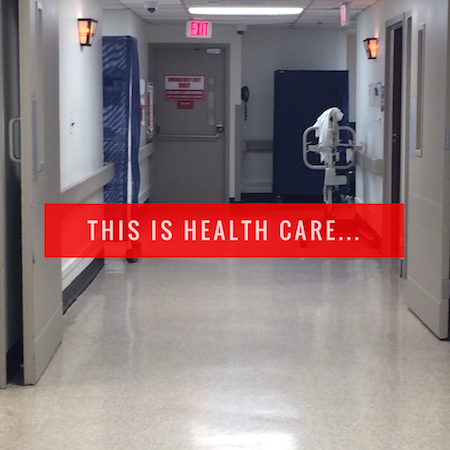Why I Fear The American Health Care System
May 19, 2016

I’m not bragging when I say that I’ve been blessed with good health. I’m extremely grateful that I am healthy, pain- and disease-free for almost 50 years. However, my good health is not all about luck. I don’t smoke, I don’t drink alcohol, I move around throughout the day and I cook most of my meals. Lately, I’ve upped my health game by cutting out sugar and other food additives. I’m earning my good health because I’m afraid of illness and disease. I don’t want to be at the mercy of the American health care system.
The Darker Side Of Health Care
This week I had an opportunity to witness a part of our health care system most of us rarely think about, but should. Rehabilitation and nursing home care. It was an educational but difficult experience for me.
I was visiting an elderly aunt undergoing rehabilitation following the amputation of her leg. Despite the gravity of her situation her rehabilitation has been successful in that she is strong enough to hop around on one leg. She believes that with a prosthetic leg or braces to assist her in walking, she is capable of living independently once again. But there she sits, with no idea of if or when she will receive this final treatment. And she doesn’t sit alone. This place was full of individuals in various states of rehabilitation; however, most of the patients are there for custodial care.
Throughout my near daylong stay at this facility, I saw dozens of individuals in wheelchairs. Others were confined to their beds most of the day. These are the individuals with serious cognitive disabilities. There were as many staff members as patients—including certified nurse aids (CNA), registered nurses (RN), licensed practical nurses, medical doctors, social workers, dietitians, physical, occupational and speech therapists, and recreation therapists.
This was American health care in action and it left me feeling hopeless and scared.
Is This Even Health Care?
Americans don’t like to talk about disability. Being or becoming disabled is something that happens to other people. But that other person could be any one of us. There are over 39 million people living with disabilities in the U.S., over 12% of the population. These numbers are expected to increase in all categories of disabilities. So, we need to decide as a country if this is health care we are providing to these individuals or something else. Based on my recent experience at the rehab and care center, it seems like something else.
When I think of health care, I think of treatment to get you to a better state of health. This rehab and care center made me rethink this simple and untrue definition of health care. This facility clearly had more permanent residents than temporary ones, which made me wonder why they put the two groups together. Why not have separate temporary rehab centers for patients recovering from major surgeries and need temporary inpatient care? That way the focus is on treatment to get people to a better state and not toileting, feeding, dressing and medicating them for another day in bed or a wheelchair.
Sure, combining rehab and nursing home care may make financial sense for facilities that live off of Medicare and Medicaid payments. Disabled people are more likely to have health insurance than people without disabilities thanks to Medicaid. And, 99% of people 65 and over have insurance thanks to Medicare and Medicaid. But does placing people with greatly different needs for health care in the same facility make sense? No, and this is why.
Despite the different needs of people needing temporary rehab and those needing custodial care, the rehab and care staff will treat these groups the same to make managing the facility more manageable.
blog comments powered by Disqus


 Denise Perkins
Denise Perkins




